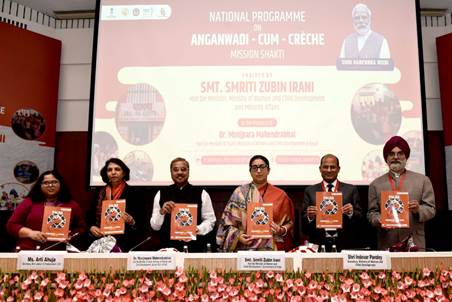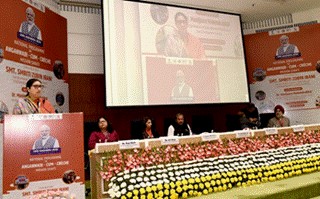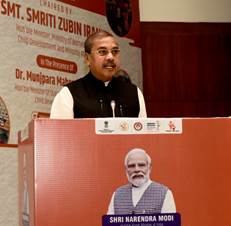Ministry of Women and Child Development
National Programme on Anganwadi-cum-Crèche (Palna) held
Union WCD Minister Smt. Smriti Irani urges States and UTs to identify areas with a higher number of women working in unorganised sector to connect them with the Centre's Anganwadi-cum-creche scheme
A comprehensive Standard Operating Procedure on Anganwadi-Cum- Crèche Under Palna released
Government aims to establish 17000 Crèches out of which 5222 approved till date
Two additional Crèche workers and helpers will be deputed along with the existing Anganwadi workers and Anganwadi helpers under Palna scheme
Posted On:
22 DEC 2023 9:07AM by PIB Delhi
A National Level Programme on Anganwadi-Cum-Crèche Under Palna was held at Vigyan Bhawan, New Delhi today (21tst December 2023) to release the Standard Operating Procedure (SOP) of the scheme. The Anganwadi-Cum- Crèche initiative under the Palna Scheme underwent revisions and was included as part of the Samarthya sub-component of Mission Shakti, starting from April 2022. The central aim of Anganwadi-cum- Crèches is to meet the demand for quality childcare facilities and enable women to actively participate in the workforce.
The programme started with an inaugural session under the chairpersonship of Union Minister of Women and Child Development and Minority Affairs, Smt. Smriti Zubin Irani in the presence of Minister of State for Ministry of Women and Child Development and AYUSH, Government of India Dr. Munjpara Mahendrabhai. The other dignitaries that graced the occasion included Shri Indevar Pandey, Secretary, Ministry of Women & Child Development, Government of India; Ms. Arti Ahuja, Secretary, Ministry of Labour & Employment, Government of India; Shri. Inder Deep Singh Dhariwal, Joint Secretary, Ministry of Corporate Affairs, Government of India and Ms. Rajul Bhatt, Joint Secretary, Department of Personnel & Training, Government of India. The event was attended by senior officers from MoWCD, State WCD Officers, CDPOs, Lady Supervisors, Anganwadi Workers from across the country and experts from Civil Society Organisations.
In his introductory speech Shri. Indevar Pandey, Secretary, MWCD stated that the Anganwadi-cum-Crèche (Palna) scheme aims to address the gap that exists particularly in urban areas where support for childcare from family members is not available and there is a need for institutional support to facilitate contribution of women in the economy. He said that two additional Crèche workers and helpers will be deputed along with the existing Anganwadi workers and Anganwadi helpers under Palna scheme.
Ms. Aarti Ahuja, Secretary, Ministry of Labour & Employment, Government of India emphasized on the fact that participation of women in the workforce has increased to 37% in 2022. The graph for women participation is now seeing an upward trend and it is the responsibility of all to enable women participation in the workforce. Government’s determination to aid women workforce participation is evident in various provisions that have been added and revised in the Maternity Benefit Act, 2017.
Shri. Inder Deep Singh Dhariwal, Joint Secretary, Ministry of Corporate Affairs, highlighted the importance of Corporate Social Responsibility (CSR) within the social sphere. This focus arises from the recognition of businesses' potential in driving positive societal change. Ms. Rajul Bhatt, Joint Secretary, Department of Personnel & Training, stressed the need to nurture family friendly workplaces and to facilitate women’s participation in nation building.
A short film that captures the essence of the scheme and its features was screened on the occassion. The Standard Operating Procedure (SOP) for Anganwadi-cum- was also released by Smt. Smriti Zubin Irani. The SOP outlines a comprehensive framework for the administration and implementation of the scheme, including administrative hierarchy, roles and responsibilities of the workers and monitoring checklist. The SOP will serve as a vital tool in ensuring the successful and efficient operation of Anganwadi-cum- Crèches, contributing to the overall well-being of the community.

Dr. Munjpara Mahendrabhai highlighted various efforts of the Ministry in facilitating women’s economic empowerment. He further informed that the government aims to establish 17000 Crèches out of which 5222 have been approved till date. He stated that, “Anganwadi cum Crèche will prove to be instrumental in improving the labour force participation among women, thereby making substantial impact on the economic development of Bharat”.


Union Minister for Women and Child Development and Minority Affairs, Smt. Smriti Zubin Irani emphasised on the need for quality child care for women and said, “Our first priority is to reach out to the woman who earns her livelihood, by leaving her own house to work in another, woman who works as agricultural labourer, woman who works as construction worker, under Palna and provide an opportunity to participate in economic activity, so that along with her livelihood she is able to provide a safe and secure environment for her children.”. She further appealed to the State/District officials and CSO thought leaders to not consider the proposed 17000 crèches as threshold. She said that the central Government would extend their support to states which wish to open more than the proposed number of AWCCs. She further instructed the states to conduct a foundational assessment of construction sites in their respective regions and to map urban and peri-urban areas where women participation in organised and unorganised sector is more, so that appropriate sites for construction of crèches could be identified.
Union Minister of Women and Child Development proposed that the Ministry will provide a framework in consultation with States, for such an engagement where the safety and health needs and nutrition for children are ascertained by whoever seeks to serve in the sector in private capacity. She emphasized the potential of childcare sector in providing economic opportunity to women. She further emphasized on the efforts of the Prime Minister to close unaccounted and unregistered institutions where children were exploited/violated. To ensure such institutions cease to exist, having a police verification of not only men but even women working in such institutions is a pre-requisite, she added.
The second part of the programme entailed two panel discussions. The panel discussion on 'Care Economy: Care to Empowerment' highlighted that transformative care policies can yield positive health, economic and gender equality outcomes for children, elderly and people with disabilities. It can also pave the way for women's employment as well as increased care roles for men in the family. The panel also discussed the need for imparting skills and courses on care work in the country to strengthen the care economy. The discussion also emphasised on the need for gender sensitive policy tools that integrate the understanding of care work and the economic opportunities associated with care work. Creating an enabling care-work ecosystem is crucial to facilitate women's entry into the workforce, alleviate the unpaid care and domestic workload, and safeguard their holistic well-being. The suggestion involves prioritizing investments in affordable and easily accessible childcare and elderly care facilities to tackle the prevalent burden of unpaid care work. Shri Nitishwar Kumar, Additional Secretary and Financial Advisor, Ministry of Women & Child Development, Prof. Manish R. Joshi, Secretary, University Grants Commission; Ms. Kanta Singh, Deputy Country Representative, UN Women Office in India; Ms. Mitali Nikore, Economist in Gender Mainstreaming; Ms. Rumjhum Chatterjee, Chairperson, Confederation of Indian Industry (CIl); Ms. Jyoti Vij Additional Secretary General, FICCI were the panellists for the panel discussion.
The second round of panel discussion was on “Interventions in implementing day care centres/ crèches.” The discussion centered around the process and the trajectory of the development of the schemes of the Government, towards the institutionalization of day-care centres within government programmes. The panel also highlighted best practices from different States on community childcare models, such as creches adjacent to school campuses to ensure continuity in education for elder siblings, especially daughters. The panellist stressed the importance of growth in the care economy sector for the creation of formal employment opportunities, as well as the development of supportive infrastructure, including curriculum, skill advancement, and job creation. Selecting safe locations compliant with regulations further ensures the safety of children. Additionally, proposing specialized caregiving schemes for children with mental or physical disabilities ensures inclusivity within these care environments. Dr. Preetam B. Yashvant , Joint Secretary, Ministry of Women & Child Development, Ms. Amneet P Kumar, Commissioner & Secretary, Department of Women and Child Development, Government of Haryana, Ms. Sumitra Mishra, Executive Director, Mobile Crèches, Ms. Veena Bandyopadhyay, Social Policy Specialist, UNICEF Representative to India and Ms. Saachi Bhalla, Director, India Country Office, Bill & Melinda Gates Foundation was part of the panel discussion on Intervention in implementing Day Care Centres/ Crèches.
*****
SS/TFK
(Release ID: 1989473)
Visitor Counter : 6736